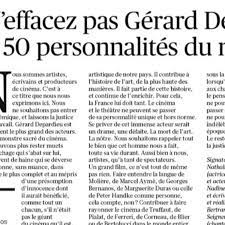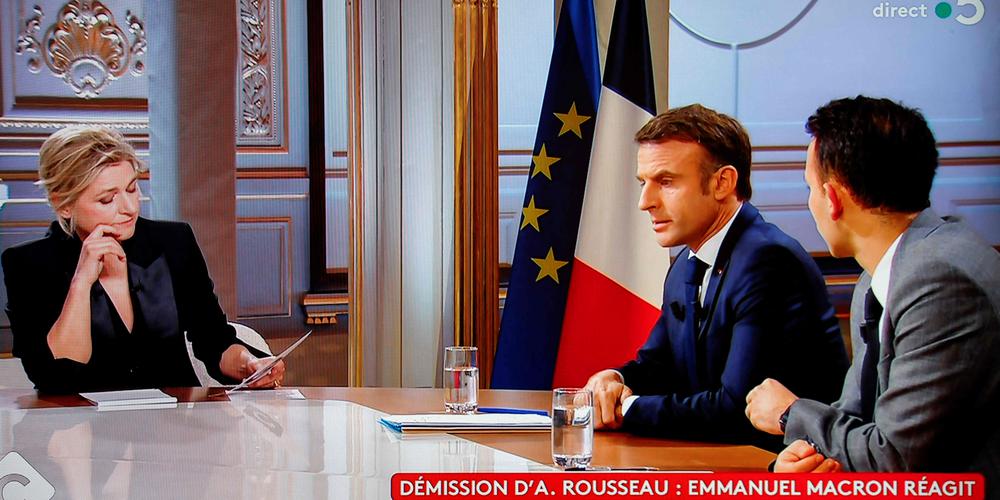Gérard Depardieu is the second highest-grossing actor in the history of French cinema behind Louis de Funès. He has been in over 170 films from literary greats like "Cyrano de Bergerac" outrageous cult classics such as "Les Valsueues" and children's movies such as "Asterix". Everyone in France has watched and loved a Depardieu film, he is even part of the school curriculum. So what happens when France's most famous, internationally known actor is accused and investigated for the heinous of crimes of rape and sexual aggression?

The headlines over the last few days tell a story of the strength of feeling around this investigation.
"N'effacez pas Gérard Depardieu" was an early headline in Le Figaro including the photos of 50 stars who had come out in his support.
"Affaire Gérard Depardieu : plus de 600 artistes signent une « contre-tribune » afin de « briser la loi du silence »" was the headline in Le Parisien a few days later where 600 stars came out against the actor saying it's time to break the silence.
"Affaire Depardieu : une semaine après la déclaration de Macron, le cinéma français se déchire" reads the headline in The Huffington Post following Macron's show of support for the actor on the primetime TV show C à vous.
"Monsieur le président, vos paroles dénient à toutes les femmes victimes de violence le droit à être entendues et crues" reads the open letter from #Metoomedia in Le Monde.
"N'effacez pas Gérard Depardieu" was an early headline in Le Figaro including the photos of 50 stars who had come out in his support.
"Affaire Gérard Depardieu : plus de 600 artistes signent une « contre-tribune » afin de « briser la loi du silence »" was the headline in Le Parisien a few days later where 600 stars came out against the actor saying it's time to break the silence.
"Affaire Depardieu : une semaine après la déclaration de Macron, le cinéma français se déchire" reads the headline in The Huffington Post following Macron's show of support for the actor on the primetime TV show C à vous.
"Monsieur le président, vos paroles dénient à toutes les femmes victimes de violence le droit à être entendues et crues" reads the open letter from #Metoomedia in Le Monde.

#Metoo, Cancel Culture and Innocent until proven guilty
L'affaire Depardieu has provoked a national debate about the #metoo movement, cancel culture and the right to be presumed innocent until proven guilty. It has also exposed divisions across generations and is forcing a re-examination of what French society finds acceptable in its art and culture both today and in the not too distant past. Public debate is taking place in the newspapers, in street demonstrations, on TV and of course across social media. Politicians, including Macron the French President, and prominent actors are all making their positions known as the debate outside the courtroom intensifies.
Depardieu - No stranger to controversy
A quick glance through quotes from Depardieu on the IMBd site will tell you that this actor does not eschew controversy.
"When I'm stressed, I still drink five or six bottles of wine a day. When I'm relaxed, three or four, but I'm trying to cut down. You think alcohol calms you down, but you become addicted to it." [2005]
"[on Juliette Binoche] Please can you explain to me what the secret of this actress is meant to be? I would really like to know why she has been so esteemed for so many years. She has nothing. Absolutely nothing! She is nothing. Compared with her, Isabelle Adjani is great even is she's totally nuts. Or Fanny Ardant - she is magnificent, extremely impressive. But Binoche? What has she ever had going for her?" [2010]
"I had wonderful companions during my life, and afterwards we separated - but not like enemies. We stayed friends. It was always a costly thing to get a divorce, for example, but it's just money. It's not important. I had children with really wonderful women. I still like them. I think we can learn everything from women. And I especially learnt from women who have been my lovers or my mistresses. But I also learnt a lot from female writers, like Virginia Woolf and Anaïs Nin. I prefer them to, say, Hemingway, and I would always prefer them. Although I very much like F. Scott Fitzgerald, I would prefer Colette, for example. Because we can learn from them. Also because these women are born mothers. They live as mothers. And they often wait; they wait for something in their life, especially if they're strong women. And these are the human beings that make me patient, make me want to wait and accept inertia."
"France is likely to become a Disneyland for foreigners, populated by imbeciles making wine and stinky cheese for tourists. There is no more freedom, people are being manipulated."
"When I'm stressed, I still drink five or six bottles of wine a day. When I'm relaxed, three or four, but I'm trying to cut down. You think alcohol calms you down, but you become addicted to it." [2005]
"[on Juliette Binoche] Please can you explain to me what the secret of this actress is meant to be? I would really like to know why she has been so esteemed for so many years. She has nothing. Absolutely nothing! She is nothing. Compared with her, Isabelle Adjani is great even is she's totally nuts. Or Fanny Ardant - she is magnificent, extremely impressive. But Binoche? What has she ever had going for her?" [2010]
"I had wonderful companions during my life, and afterwards we separated - but not like enemies. We stayed friends. It was always a costly thing to get a divorce, for example, but it's just money. It's not important. I had children with really wonderful women. I still like them. I think we can learn everything from women. And I especially learnt from women who have been my lovers or my mistresses. But I also learnt a lot from female writers, like Virginia Woolf and Anaïs Nin. I prefer them to, say, Hemingway, and I would always prefer them. Although I very much like F. Scott Fitzgerald, I would prefer Colette, for example. Because we can learn from them. Also because these women are born mothers. They live as mothers. And they often wait; they wait for something in their life, especially if they're strong women. And these are the human beings that make me patient, make me want to wait and accept inertia."
"France is likely to become a Disneyland for foreigners, populated by imbeciles making wine and stinky cheese for tourists. There is no more freedom, people are being manipulated."
C dans l'air - La génération Depardieu se rebiffe… Et choque !
L'emisson et les commentators
La génération Depardieu se rebiffe… Et choque !
Le soutien de Macron
L'effacement (Cancel Culture)
L'Aigle Noir
Les Valseues

A note about expressing an opinion in French
I find debating issues, ideas and ideologies in French intriguing. I like the way that arguments are built, evidenced and then considered by the other party. I find this whole debate around Depardieu refreshing. The issues are being discussed head on, the key players are able to make their positions known and it seems that real discussion is happening.
This is something that I really enjoyed about French culture when I lived there. I will be following this saga as it develops and plays out and, if you are interested, I hope you feel equipped to do so too.
This is something that I really enjoyed about French culture when I lived there. I will be following this saga as it develops and plays out and, if you are interested, I hope you feel equipped to do so too.


